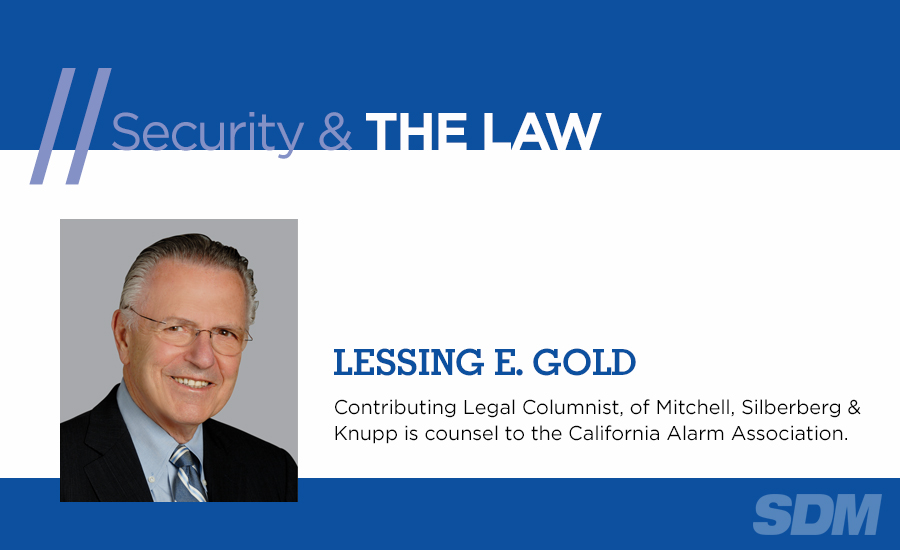An interesting case in Georgia arose when a brother brought an action against a home security company for failing to properly notify. The complaint alleged that the decedent, who had Alzheimer’s disease, died from hypothermia after wandering from her home. Despite the alarm being activated at the home, the alarm company failed to contact the decedent’s niece and neighbor as instructed. The next morning, the neighbor found the decedent had succumbed overnight to hypothermia.
The alarm company filed a motion to dismiss claiming, among other things, that the contract signed by the decedent barred the lawsuit or alternatively limited the plaintiff’s recovery.
Georgia has historically afforded great protection to the freedom to contract with another person. The courts are thus bound to enforce contracts as made so long as they are not contrary to law or public policy. Generally, exculpatory clauses in which a business seeks to relieve itself from its own negligence are valid and binding and are not void as against public policy unless they purport to relieve liability for acts of gross negligence or willful or wanton conduct. Because exculpatory clauses may amount to an accord and satisfaction of future claims and waive substantial rights, they require a meeting of the minds on the subject matter and must be explicit, prominent, clear and unambiguous.
The court distinguished this case from other limitation of liability provisions where the court found the provision unenforceable because the provision was on the back of the home security contract or was written in small, uncapitalized font within a subparagraph that also included seemingly unrelated information about the potential liability of police or fire departments.
In this case the contract signed with the defendant alarm company contains several provisions designed to limit the defendant’s liability. These provisions all appear in section 5 of the contract, entitled LIMITATION OF LIABILITY. The first two subparagraphs in section 5 read in part:
A. INSURANCE: WAIVER OF SUBROGATION. I AGREE THAT COMPANY IS NOT PROVIDING ME WITH INSURANCE OF ANY TYPE ... IN THE EVENT OF ANY LOSS, DAMAGE, OR INJURY, I WILL LOOK EXCLUSIVELY TO MY INSURER AND NOT TO COMPANY TO COMPENSATE ME OR ANYONE ELSE. I RELEASE AND WAIVE FOR MYSELF AND MY INSURER ALL SUBROGATION AND OTHER RIGHTS TO RECOVER AGAINST COMPANY ARISING, AS A RESULT OF THE PAYMENT OF ANY CLAIM FOR LOSS, DAMAGE OR INJURY.
B. NO GUARANTEE; NO LIABILITY. COMPANY’S EQUIPMENT AND SERVICES DO NOT CAUSE AND CANNOT ELMINATE OCCURRENCES OF THE EVENTS THEY ARE INTENDED TO DETECT OR AVERT. … COMPANY DOES NOT UNDERTAKE ANY RISK THAT I … MAY BE SUBJECT TO INJURY OR LOSS IF SUCH AN EVENT OCCURS. THE ALLOCTION OF SUCH RISK REMAINS WITH ME, AND NOT WITH COMPANY. I RELEASE, WAIVE, DISCHARGE AND PROMISE NOT TO SUE OR BRING ANY CLAIM OF ANY TYPE AGAINST COMPANY FOR LOSS, DAMAGE, INJURY, RELATING TO THE EQUIPMENT OR SERVICES PROVIDED BY COMPANY.
In determining whether a limitation of liability clause or an exculpatory clause is prominent, courts may consider a number of factors. The important language in the contract is prominent and is repeated in many sections throughout. The court found that the exculpatory provisions of the contract are enforceable. As a result, the plaintiff’s claims for breach of contract, negligence, negligent supervision and training, and fraudulent misrepresentations are barred by the contract in this case and must be dismissed.
READERS ASK
Q: We are an alarm company specializing in commercial security. One of our subscribers has asked us to install an alarm in a storage facility next to his home. By accepting this assignment, would I require a home improvement license or do I have to comply with any home improvement law?
A: I cannot give you an answer without knowing what state you are doing business in. Every state has its own home improvement laws. I will mention, however, that recently in the State of Maryland, the state charged an individual for acting as a home improvement contractor without a license, and the individual was convicted. The individual offered to paint a chicken house that was about a quarter of a mile from the recipient’s home. He claimed that the state failed to meet the definition of home improvement because the chicken houses were “separate from the actual property where the house is located” further arguing that the chicken houses are “farm buildings” that are “separate and distinct from the dwelling property.”
The circuit court stated that “home improvement includes construction, improvement or replacement on land adjacent to the building of a driveway, fallout shelter, fence, garage, landscaping, deck, pier, porch or swimming pool, even shore erosion. The court indicated that this was meant to cover any structure that’s in any way adjacent to the property. Thus the court found that the appellant was guilty of violating the Maryland code.
On appeal, the Appeals Court in Maryland indicated that a home improvement means “the addition to or alteration, conversion, improvement, modernization, remodeling, repair, or replacement of a building or part of a building that is used or designed to be used as a residence or dwelling place or a structure adjacent to that building. The court found that the chicken houses were about a quarter of a mile away from the home and the property was leased for the purposes of a chicken farming business. The chicken houses were not designed to be used as a residence, a dwelling place or a structure adjacent to the home. Therefore, the circuit court had insufficient facts or evidence to conclude that the appellant’s actions violated the Maryland code and that no trier of fact could have found that appellant failed to perform a home improvement contract. Therefore the judgment of the circuit court was reversed.
I hope this is useful.





